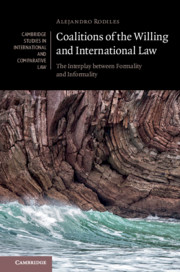Book contents
- Reviews
- Coalitions of the Willing and International Law
- Cambridge Studies in International and Comparative Law: 135
- Coalitions of the Willing and International Law
- Copyright page
- Dedication
- Epigraph
- Contents
- Foreword
- Acknowledgements
- Abbreviations
- 1 Introduction
- 2 The Conceptual Metaphor ‘Coalition of the Willing’
- 3 Testing the Frame: The Genealogy of a Catchphrase
- 4 Global Security Governance by Posse: The Proliferation Security Initiative & Co.
- 5 Coalitions of the Willing in Context: The Interplay between Formality and Informality
- 6 Coalitions of the Willing and the Role of Law in the Deformalized Global Complex
- 7 Conclusion
- Bibliography
- Index
- Cambridge Studies in International and Comparative Law
2 - The Conceptual Metaphor ‘Coalition of the Willing’
Published online by Cambridge University Press: 10 August 2018
- Reviews
- Coalitions of the Willing and International Law
- Cambridge Studies in International and Comparative Law: 135
- Coalitions of the Willing and International Law
- Copyright page
- Dedication
- Epigraph
- Contents
- Foreword
- Acknowledgements
- Abbreviations
- 1 Introduction
- 2 The Conceptual Metaphor ‘Coalition of the Willing’
- 3 Testing the Frame: The Genealogy of a Catchphrase
- 4 Global Security Governance by Posse: The Proliferation Security Initiative & Co.
- 5 Coalitions of the Willing in Context: The Interplay between Formality and Informality
- 6 Coalitions of the Willing and the Role of Law in the Deformalized Global Complex
- 7 Conclusion
- Bibliography
- Index
- Cambridge Studies in International and Comparative Law
Summary
- Type
- Chapter
- Information
- Coalitions of the Willing and International LawThe Interplay between Formality and Informality, pp. 10 - 37Publisher: Cambridge University PressPrint publication year: 2018



